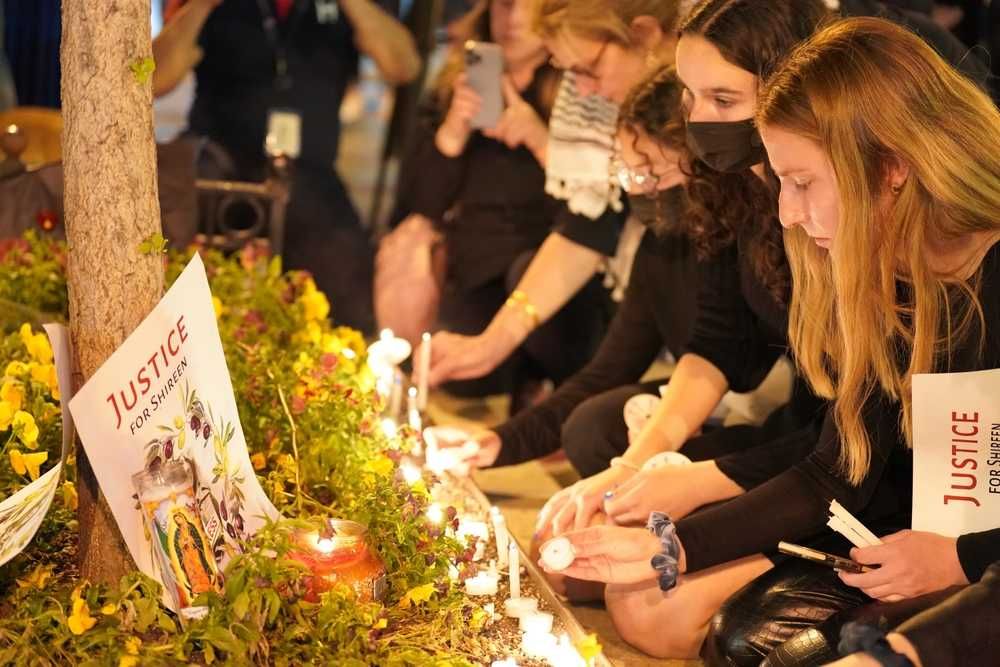Retired US Col. Steve Gabavics went public Monday with an account he had previously only spoken about anonymously—the story of his investigation into an Israeli soldier’s killing of Palestinian-American journalist Shireen Abu Akleh in 2022 and the unsuccessful attempts he made to ensure the US State Department would accurately report his findings: that Abu Akleh was intentionally shot.
Gabavics previously discussed his experience investigating Abu Akleh’s killing just days after it happened in a documentary produced by Zeteo News, but he wasn’t named in the film. On Monday, he came forward publicly for the first time in an interview with the New York Times to discuss the case he said has “bothered [him] the most” of any he investigated during his 30-year military career.
In the days after Abu Akleh was fatally shot in the head while reporting on an Israel Defense Forces (IDF) raid on a refugee camp in Jenin in the West Bank in May 2022, Gabavics was assigned to lead an investigation into the killing by the Office of the United States Security Coordinator, where he was chief of staff. The State Department office coordinates with Palestinian and Israeli security officials and was ordered by the Biden administration to review Abu Akleh’s killing.
He traveled to Jenin with three other people from the office to investigate the shooting and concluded “beyond a reasonable doubt” that the Israeli soldier who shot Abu Akleh must have known she was a journalist—and therefore required under international law to be protected from military attacks while reporting on a conflict.
They did not conclude that the soldier was specifically or deliberately targeting Abu Akleh, but they determined that:
- Soldiers were aware of journalists in the area due to records of Israeli military radio traffic on the morning before the shooting;
- There had been no gunfire coming from the journalists’ direction that might provoke the Israeli soldiers to shoot in self-defense;
- There was an Israeli military vehicle stationed down the road from Abu Akleh, from which a sniper would have been able to see the journalists clearly; and
- When Gabavics visited the scene of the shooting hours after it occurred, his colleagues wore blue vests similar to Abu Akleh’s navy-blue "Press" vest and stood where she was when she was killed while Gabavics stood where the shooter's vehicle had been; they were easily visible to Gabavics.
Gabavics told the Times that the claim that the shooting was unintentional, ultimately included in the State Department’s report, was “absurd.”
The State Department’s account of an accidental killing would mean that the “individual popped out of the truck, just was randomly shooting, and happened to have really well-aimed shots and never looked down the scope,” said Gabavics. “Which wouldn’t have happened.”
Gabavics explained the circumstances that led to the State Department announcing in July 2022 that Abu Akleh had been unintentionally killed: His superior, Lt. Gen. Michael R. Fenzel, who led the Office of the Security Coordinator at the time, disagreed with his assessment and repeatedly refused to publish a report that explained Gabavics’ findings accurately.
As Gabavics told Mehdi Hasan at Zeteo News on Monday, Fenzel told Gabavics that he had spoken to an Israeli commander, who called the shooting an accident “that was a matter of tragic circumstances.”
“So the US general takes the word of a foreign general over the word of his own officer, who he sent to investigate,” said Hasan.
Gabavics also told the Times that Fenzel threatened to fire him as the two disagreed about what the State Department report should say. He included language saying the shooting was intentional in a draft report several times, but Fenzel repeatedly deleted his additions.
He said he and the other three investigators were “flabbergasted that this is what they put out.”
Fenzel told the Times in a statement that he stands by “the integrity of our work and [remains] confident that we reached the right conclusions.”
Officials who spoke to the Times on condition of anonymity said Fenzel’s office likely aimed to “preserve its working relationship with the Israeli military.”
But Gabavics told the Times that the outcome of his investigation “continued to be on my conscience nonstop,” and said he continued to clash with Fenzel over the US government’s report on Abu Akleh’s death until he retired in January.
The Council on American-Islamic Relations (CAIR) applauded Gabavics for “bravely coming forward and confirming what was obvious to everyone: An Israeli sniper deliberately murdered an American journalist and the Biden administration covered it up.”
“We call on President [Donald] Trump to investigate Lt. Gen. Michael R. Fenzel and any other officials who were allegedly involved in the cover-up of Shireen Abu Akleh’s assassination,” the group said.
CAIR urged the State Department and FBI to “pursue a real investigation” into Abu Akleh’s killing. The group condemned President Joe Biden and his top foreign affairs officials, including former National Security Adviser Jake Sullivan and former National Security Council Coordinator for the Middle East Brett McGurk for “enabling the Israeli government’s abuses.”
“These individuals must never again serve our government,” said CAIR, “and should be fired from the prestigious roles they have secured in academia since leaving office.”
